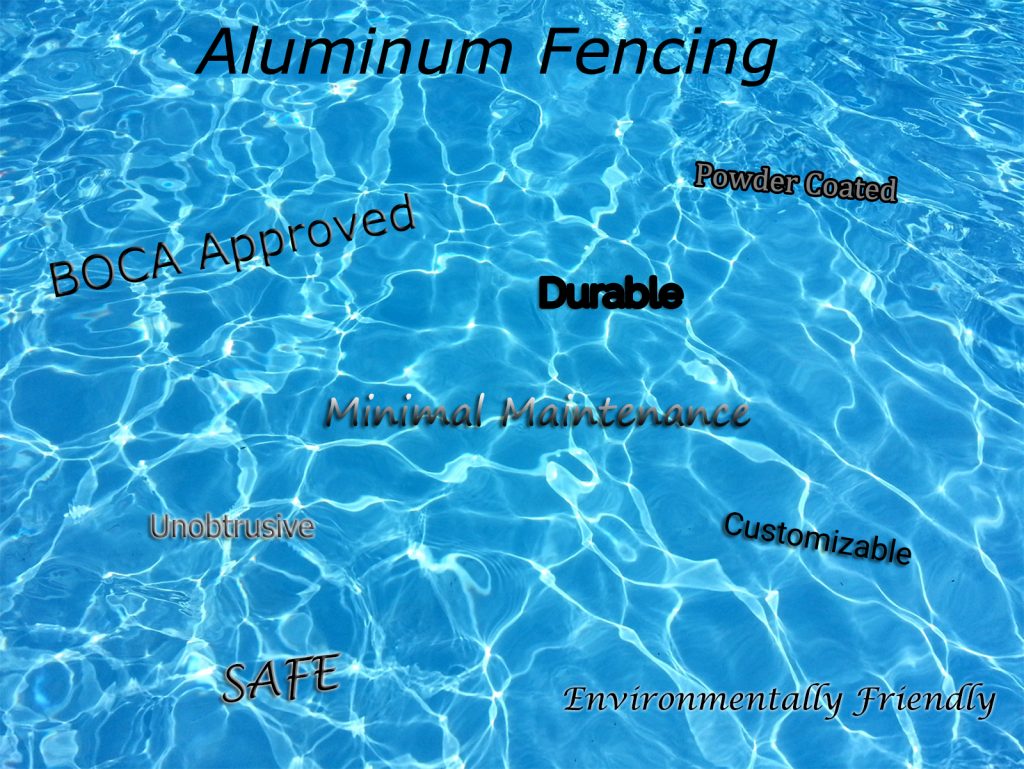
Pool safety has become more of a hot topic in recent years. Children are naturally drawn to the water which can be a problem when unsupervised outdoors. On average over two hundred young children each year drown because of backyard swimming pool accidents. With the prevalence of swimming pools within the last ten to fifteen years an emphasis on regulating and implementing safety requirements is being seen across the United States. Pool safety regulations, including the installation of fencing, have saved a number of families from experience loss through accidental drowning.
There are three options pool owners have when it comes to installing permanent safety fence for swimming pools including: aluminum fence panels, vinyl, and wood. Below we will discuss the advantages and disadvantages of all three types of permanent swimming pool fencing.
Decorative Aluminum Fence Panels – BOCA Approved
The most popular material in permanent pool fencing is aluminum in part because it is durable, low maintenance, and aesthetically pleasing. Aluminum fence panels are coated with a powder coating which offers extreme durability, little to no maintenance, is environmentally friendly, and comes in a number of color and ornamental options that compliment all landscapes.
Wrought iron, although similar in look, is not used around swimming pools as it is more expensive and difficult to maintain, especially from rusting. Residential aluminum fence panels traditionally come in six-foot sections although can be customized into shorter or longer panels if needed. In order to be BOCA approved the aluminum fence that is installed around your swimming pool must be at least forty-eight inches in height, horizontal railings must be at least forty-five inches from the bottom rail to prevent climbing.
Decorative aluminum fencing is perfect for pool fencing when homeowners are looking for an option is pool safety fencing that is low maintenance. It is also a great option for those that wish to see within the pool area from outside of the pool. This works well for families with small children as a parent can visually see children playing outside of the pool in the backyard while supervising children in the pool. The most popular option is black aluminum fencing however is offered in 8 colors and a number of decorative styles to choose from.
Advantages of Aluminum Fencing Include:
- Durability
- Minimal Maintenance
- Unobtrusive
- Custom Heights and Widths
- Multiple Colors, Styles, & Decorative Options
- Open Pickets, Visible from Backyard, Outside of the Pool
Disadvantage of Aluminum Fence Include:
- Open Pickets, Not Private
Vinyl
Vinyl is another option that can be used for pool safety fencing. There are two options including solid privacy fencing and picket fencing. Some vinyl panels include lattice or spindles at the top for a decorative accent.
Advantages of Vinyl Include:
- Solid Vinyl Is Private
- Solid and Picket Styles
- Custom Heights
Disadvantages of Vinyl Include:
- Only White
- Not Mildew Resistance
- Pickets and Rails are Bulky
- Vinyl Sags Over Time
Wood
Wood is a popular option in fencing. Wood has been an available option in fencing for decades. Wood requires a great deal of maintenance when used as pool fencing. It is a low-cost material that is highly customizable that is a viable option as a permanent pool fence when homeowners are willing to do the work to maintain it.
Advantages of Wood Include:
- Customizable in Size and Style
- Inexpensive
- Able to Be Painted/Stained in any Color
Disadvantages of Wood Include:
- High Maintenance
- Warps and Twists
- Not Resistant to Mold or Mildew
iFenceUSA is an online distributor of wholesale aluminum fences and gates for residential, resort, commercial, and industrial installation. As an industry leader in maintenance-free aluminum fencing products we have all your aluminum fence and gate needs covered. More information can be found online at https://ifenceusa.com/.